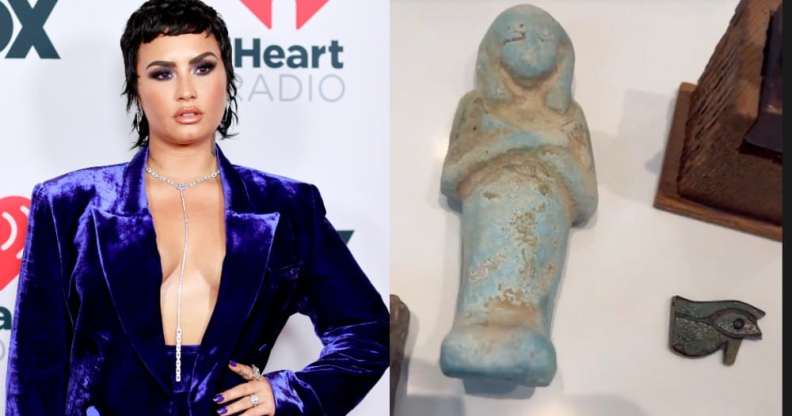Demi Lovato says they’ve been buying ‘Egyptian artefacts’ online. Experts are having none of it

Demi Lovate dragged over her Egyptain artifacts collection (Getty/Emma McIntyre/Instagram)
Demi Lovato has caused a stir in the art community after they claimed to have purchased “Egyptian artefacts” online.
The 29-year-old singer showed off their haul on Instagram along with the “certificates of authenticity” they said came with the items from MuseumSurplus.com.
Some of the art included an Egyptian Eye of Horus supposedly dating between 1400 and 713 BC and a cuneiform tablet from the “Babylonian-Assyrian Period”.
But Lovato might want to get a refund after art crime profession Erin L. Thompson and archaeologist Peter Campbell questioned the legitimacy of the artefacts.
These are not so much "cuneiform tablets" as "pre-gnawed dog biscuits." Also, you'd better hope they're fakes – genuine tablets like this have frequently been looted from Iraq, including to support insurgent groups like ISIS. pic.twitter.com/rMyaNT1wWE
— Erin L. Thompson (@artcrimeprof) March 7, 2022
Thompson, a professor of art crime at John Jay College in New York, spoke with The Hollywood Reporter about Lovato’s purchases
She said she didn’t believe anything Lovato had shown off on Instagram was legitimate.
“There’s no indication of provenance of where Museum Surplus got these before offering them for sale,” Thompson said. “There’s no way that these would be accepted by a museum.
“There’s no way that any sophisticated collector who wanted to make sure that they had value and could resell the things would accept or buy those either.”
Thompson added: “The Egyptian figures are of types that have been forged for centuries. Visitors to Egypt have thought these were cool since the early 19th century.
“So there’ve been thousands and thousands of them made for tourists as souvenirs, or as forgeries.”
Thompson urged readers in the market for antiquities to do their due diligence before making a purchase.
“People are asking, ‘Where did my chocolate come from? Where did my shrimp come from?’ So if you can ask those sorts of sustainability and ethical-labor-practices questions about avocados, you can ask them about antiquities,” she added.
This is… stop, just stop. pic.twitter.com/ckdnSxQuzJ— Erin L. Thompson (@artcrimeprof) March 7, 2022
Archaeologist Peter Campbell told The Hollywood Reporter he thought the certificates of authenticity were “a joke”.
“They contain none of the critical information like ownership history, export permits or find spot,” he explained.
Taking to Twitter, Campelll discussed the issues around purchasing antiquities and “cultural heritage exploitation”. He noted that the story came while he was teaching an International Heritage Crime course, “so the timing could not be more perfect”.
“It is not illegal to own old things,” he said. “The legal antiquities trade is valued [at more than] $2 billion annually. However, there is a significant trade in illicit antiquities which draws on looted materials from Egypt, Iraq, Syria, Italy, etc. And within that is a trade in fakes and forgeries.”
https://twitter.com/peterbcampbell/status/1500938566276419584
https://twitter.com/peterbcampbell/status/1500942761951956994
Repeating Thompson’s point about the important of due diligence, he continued: “Which brings me to the paperwork accompanying Demi’s purchases… This paperwork does not look like any provenance paperwork I have seen before and lacks all the critical data. I would advise any buyer to conduct due diligence before purchasing ancient objects, something that this paperwork does not fulfil on its own.”
The art expert continued: “But most importantly, why are ancient Egyptian and Iraqi artifacts available cheaply online? We can talk about the laws and the cutoff dates like 1970, but the reality is that these countries have faced cultural exploitation since the start of European imperialism through today.”
He added: “Its very cool to hold something ancient in your hands. But ask yourself – why should I be able to own this? What path did it take to get here? Were people exploited (or killed) for it to get here? Like diamonds, there are blood antiquities and each artifact needs proof its ethical.”
Lovato is yet to share further comments about the artifacts following the expert comments.

